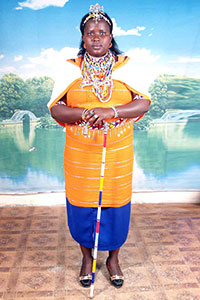Empowering Kenya’s Maasai women through greater voice and rights
In the words of Beatrice Sisina Shanka, a 26-year-old community activist from the Inkinyie community. She works for Il’laramatak Community Concerns (ICC), a non-governmental organization that addresses human rights and development concerns of pastoralist (nomadic livestock herding) indigenous peoples of Kenya, with a focus on women and girls.Date:
Empowering Maasai women is what drives me. Many rights granted to women in the 2010 Kenyan Constitution are not known or respected in pastoralist communities. Cultural taboos prevent women from owning land, denying them freedom of mobility and the opportunity to cultivate land for food or business. Abuse, physical, verbal and emotional, is generally accepted within the pastoralist community. In my community, women admit that they do not know that they are being “abused,” and that they think this is a normal way for women to be treated.

Even though every Kenyan citizen has the responsibility and right to vote, it is not uncommon for a husband to take possession of his wives’ identity card and only allow her to vote for the candidate of his choosing.
My role is to raise awareness of women’s and girls’ rights among the Maasai community in the Kajiado county of Kenya’s Rift Valley Province — the country’s largest province bordering Uganda — for them to be enlightened and to know their rights and position in society.
On 3 December 2013, we visited the Elang’ata Wuas area in central Kajiado and carried out the “16 Days of Activism” campaign against gender-based violence. It is an area with high rates of abuse — physical, emotional and verbal. Few girls enrolled in school here achieve their goals, as they are subjected to female genital mutilation (FGM) and married off at a very young age without their consent.
On 6 January 2014 we also held a forum to mark Zero Tolerance to FGM, where Naisula, a community-based umbrella organization for seven different women’s groups (namely Mai, Nadupa, Namunyak, Oreteti odupa, Oloparanai, Ingarsisi and Namelok), participated from the Inkinyie community in central Kajiado. It focused on the effects associated with this regressive practice. The Naisula women who attended the forum promised to spread the information that came out of the forum to others in the community in order for the practice to stop, and to emphasize the need for education of the girl child.
In addition, we are involved in economic empowerment programmes for women that involve them in making beadwork for sale in local and international markets.
It is for these reasons that I work, to see that the rights of Maasai women and girls are known and honoured so that their dignity can be restored, through public awareness campaigns, capacity-building and policy advocacy for indigenous women’s human rights.
For the Maasai women, I would also like to see them acquire literacy and education, leadership positions and to have freedom of expression. I would like to see them realize their entrepreneurial potential and exploit it.
For the Maasai girls, a world free from FGM and early marriages, their dreams of education fulfilled through a high number of girls being enrolled and completing schooling, that will make me the happiest woman ever!
As a woman leader, I believe that “a rich society is one in which women and girls enjoy equal rights,” and I hope that we will join hands in finding solutions to issues faced by Maasai women and girls.
In attending CSW, I hope to see the voices of Maasai women and girls heard on girl-child education, equal access to resources and leadership and that the cycle of violence and gender discrimination is broken.
Beatrice Sisina Shanka is attending CSW58 on an Yvonne Hebert scholarship. The views expressed by CSW participants in these blogs are their own and may not necessarily reflect those of UN Women.